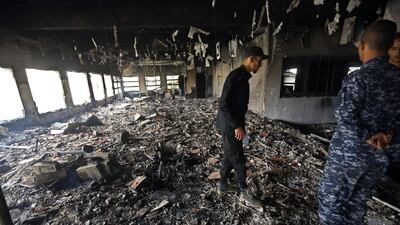Plans for Libya to hold elections and end its protracted civil war were dealt a body blow by Wednesday’s terrorist attack on the headquarters of its High National Election Commission (HNEC).
At least 14 were killed and seven wounded when a team of gunmen stormed the headquarters in downtown Tripoli, spraying office workers with gunfire before two of the attackers blew themselves up.
ISIS claimed responsibility for the attack, one of the worst terrorist outrages Tripoli has witnessed.
The attack appears to confirm that ISIS remains a force to be reckoned with in Libya. The terror group endured a sharp defeat in the latter half of 2016, when its headquarters in the central coastal town of Sirte, Colonel Muammar Gaddafi’s former hometown, was captured by Libyan militias working in concert with US air strikes.
However, that defeat has failed to rid Libya of ISIS, which has staged periodic attacks in central Libya in recent months.
The timing of the attack could not be worse. It came just two days after the Libya Quartet, a gathering of the League of Arab States, Africa Union, European Union and United Nations envoys met in Cairo to declare Libya was ready for elections.
Quartet delegates said security in Libya had improved since it last met in September, expressing that its support for the so-called Action Plan drafted by United Nations Special Representative of the Secretary General Ghassan Salame would continue.
The Action Plan, unveiled by Mr Salame last September, calls for two polls this year: First, a referendum on a proposed constitution. If the constitution is approved, he wants elections for a new parliament and presidency later this year.
“The Quartet welcomed ongoing efforts towards holding a constitutional referendum. The Quartet further emphasized the importance of holding parliamentary and presidential elections”, said a Quartet statement issued on Monday.
_______________
Read more:
US quietly increasing air strikes on ISIL in Libya
Libya oil chief condemns state capture
_______________
Libyan voter registration has been encouraging. Despite civil war and administrative chaos, the HNEC has registered 2.43 million to vote, 53 per cent of those eligible.
The HNEC said on Thursday that voter data has survived the attack, but the bigger question is whether the country is in any state to hold a poll.
Publicly, the international community insists support for democracy remains. Mr Salame met on Thursday with HNEC chief Dr Emad Al Sayeh, saying they will “review HNEC operational needs after the attack” with the UN envoy promising full support.
The US State department also reiterated support for elections, saying in a statement: “This terrorist attack against a key pillar of Libya’s fragile democracy only deepens the United States commitment to support all Libyans as they prepare for credible and secure elections”.
Support for elections has already come from Mr Agila Saleh, speaker of the elected House of Representatives parliament in the eastern town of Tobruk, who on Monday called for presidential elections.
Yet the country remains badly fractured. In December 2015, the UN supported the creation of an unelected Government of National Accord (GNA) which arrived in Tripoli in March the following year, led by Prime Minister Fayez Sarraj. But the parliament in Tobruk has not supported the GNA, and operates its own rival government in the eastern town of Al Bayda.
Parliament’s powerful Libyan National Army (LNA), commanded by Field Marshall Khalifa Haftar, has secured important victories on the battlefield, securing the so-called Oil Crescent, home to two thirds of Libya’s oil production, and last summer capturing Benghazi, Libya’s second city, from militant factions. LNA success has brought stability to most of eastern Libya but conditions are different elsewhere.
In Tripoli, the GNA has been unable to secure the city, with military power in the hands of a galaxy of militias who periodically fight one another. Most international embassies are headquartered in neighbouring Tunisia because of the security situation in the country. And after Wednesday’s deadly bomb blasts, Libya’s election hopes now appear more distant than ever.

